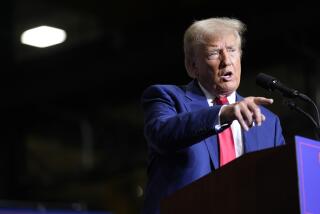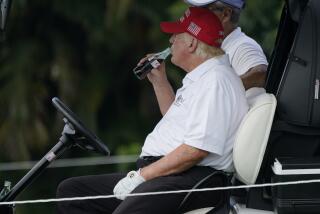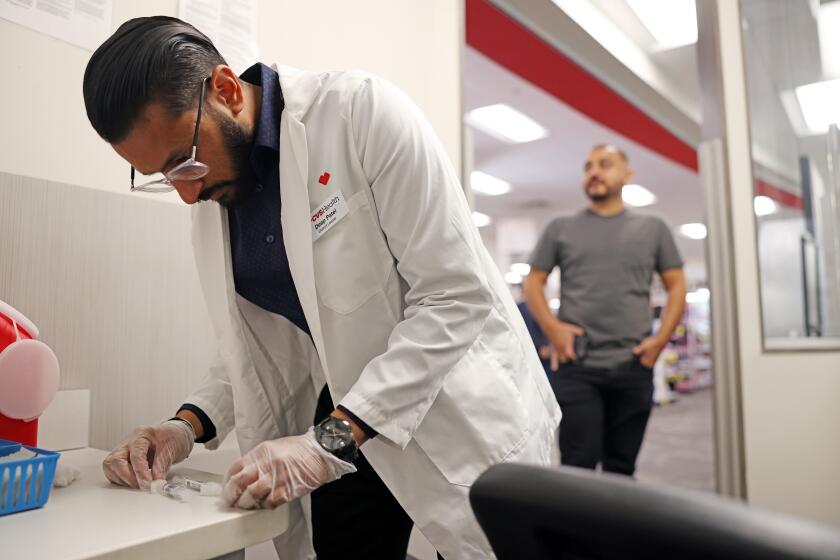Column: For God’s sake, Mr. President, don’t inject yourself with insulin
Imagine if President Trump expressed surprise about how devastating cancer can be for millions of patients and their families. Imagine if he went on to muse, almost playfully, that perhaps he should give chemotherapy a try.
Now you understand the mixture of stunned astonishment and dismay I felt, as a person with Type 1 diabetes, after Trump said the other day that maybe he should inject himself with insulin.
“I don’t use insulin. Should I be? Huh?” he said at a White House event to announce a $35 cap on co-pays by Medicare beneficiaries for the lifesaving hormone.
“I never thought about it,” Trump continued. “But I know a lot of people are very badly affected, right? Unbelievable.”
Here was the president of the United States belittling the chronic condition that 1.6 million Americans with Type 1 diabetes wrestle with on a daily basis (“I never thought about it”).
Here he was expressing disbelief that people have to inject themselves with insulin multiple times daily to stay alive, as if this hasn’t been the case since the treatment was discovered by a trio of Canadian researchers in the 1920s.
Trump was so amazed by the severity of diabetes that he scribbled a note to himself prior to the news conference. “You know, if you don’t take insulin, I just wrote this down, go blind, stroke, amputation, kidney failure and other things,” he said.
A reporter asked: “Is there any reason why someone who does not have diabetes would take insulin? Is there any sort of medical reason for that?”
Trump, at a loss for an answer, turned to the officials and drug industry executives joining him at the news conference. “Anybody like to discuss that?” he asked. “Do you want to discuss it?”
Surgeon General Jerome Adams gamely explained that 7 million Americans with Type 1 or Type 2 diabetes use insulin because, unlike people without diabetes, their bodies either don’t produce or don’t effectively process the hormone.
Type 1 diabetes is an autoimmune disorder. Type 2, which is much more widespread, is frequently associated with the global obesity epidemic.
“People such as you and I, we make our own insulin,” Adams informed Trump much as one would address a small child. “So, yes, we do utilize insulin, but we make it ourselves.”
And the president, according to a White House transcript, replied, “Ah.”
It’s already well established that Trump understands very little about healthcare. He’s suggested that people inject themselves with household cleansers to protect against COVID-19.
He said he was taking an anti-malaria drug that public health officials in the United States and worldwide said was not an effective coronavirus remedy and could be very dangerous.
So it shouldn’t have surprised anyone, myself included, when Trump revealed he doesn’t know much about insulin or diabetes, the country’s seventh-leading cause of death.
Perhaps even worse, he misled the American people when he announced “a breakthrough agreement to dramatically slash the out-of-pocket cost of insulin.”
To be sure, capping insulin co-pays at $35 a month for seniors on Medicare is a good thing considering that insulin prices have tripled since 2002.
But this protects fewer than half of all Americans who require insulin. For those of us who rely on private insurance rather than Medicare, insulin will continue to carry a list price of nearly $300 a vial, which in many cases is less than a month’s supply.
Healthcare advocates say drug companies will simply increase the cost of insulin for non-Medicare patients to make up for any shortfall from the government insurance program.
Trump also is late to the party. Some states and insurers already have announced insulin price caps, and Eli Lilly, one of the three leading insulin makers, said recently it was unilaterally capping patients’ co-pays at $35 a month.
“This move is another political stunt from a president worried about his poll numbers with seniors as his broken campaign promises keep stacking up,” said Margarida Jorge, national campaign director for the advocacy group Lower Drug Prices Now.
“Instead of tweaks and one-off proposals for political gain, we need to overhaul the system that gives drug corporations monopoly control over prices, and instead put in place fair rules that ensure access and affordability for everyone,” she said.
As I’ve written, the United States is one of the few developed countries that doesn’t regulate drug prices. Pharmaceutical companies can charge as much as they want.
If Trump was serious about reducing drug prices in this country — the highest in the world — he would introduce measures similar to those of our economic peers, which allow drugmakers to earn reasonable profits but prevent them from gouging the sick.
He also inadvertently has demonstrated the value of “Medicare for all” as a way to lower drug prices and cover everyone.
The government-run insurance program has 60 million beneficiaries. Yet, thanks to steadfast Republican opposition, it is forbidden by law from negotiating drug prices with manufacturers.
If Trump could get insulin makers to lower patient costs with just the suggestion that Medicare was being overcharged, imagine what could be accomplished if the program was given freedom to aggressively bargain on patients’ behalf for all prescription meds.
That’s how other developed countries with single-payer insurance systems do it. They use their market strength to cut the best possible deals for citizens.
Trump’s approach is based instead on hyperbole and dishonesty. He said that Obamacare is to blame for high drug prices, which it isn’t, and that drugmakers were forced to act after he “opened up competition like they’ve never seen before,” which he hasn’t.
“The prices, you will see very soon, they’re going to come tumbling down,” Trump vowed despite all evidence to the contrary.
“I hope the seniors are going to remember it,” he said. His one true priority.
More to Read
Inside the business of entertainment
The Wide Shot brings you news, analysis and insights on everything from streaming wars to production — and what it all means for the future.
You may occasionally receive promotional content from the Los Angeles Times.











